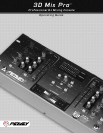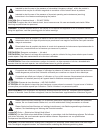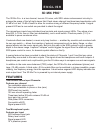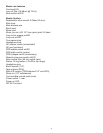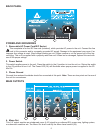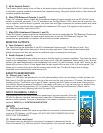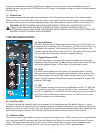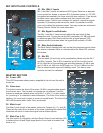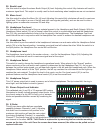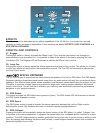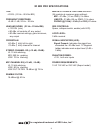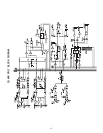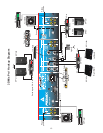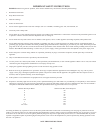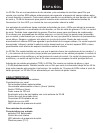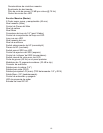
output from a turntable cartridge. By placing the switch in the Line position, you can adjust this input to
handle line level signals from a CD, Minidisc, or DAT player. An improper setting can result in severe clipping
and distortion.
13. Phono/Line
This switch changes the input gain and equalization of the Phono/Line Level Input (12) to accommodate
either a Phono or Line level signal. With the switch in, the input is set for line level signals. In the up position,
the switch sets the input for low level cartridge signals. This switch does not affect the CD/Line Level Input (11).
CAUTION: DO NOT CHANGE THE PHONO/LINE SWITCH FROM THE LINE POSITION TO THE
PHONO POSITION WHILE MATERIAL IS BEING PLAYED. A MAJOR CHANGE IN GAIN IS
INTRODUCED, WHICH WILL RAISE YOUR SIGNAL LEVEL DRASTICALLY. THIS COULD RESULT IN
DAMAGE TO BOTH HEARING AND EQUIPMENT.
CONTROLS/INDICATORS
14. Input Selector
The Input Selector switch determines which stereo pair of RCA inputs will
be present on the channel. In the CD position, the CD/Line Level Input (11)
is utilized by the channel. When placed in the Phono/Line position, the
channel uses the Phono/Line Level Input (12). This switch effectively gives
you four inputs for connecting a variety of material sources.
15. Signal Present LED
This LED illuminates to indicate that a signal is present on the channel
(prefader). Signals below the -20 dBu level will not illuminate the LED and
need to be adjusted higher with the Gain (16) adjustment control.
16. Gain
The Gain control adjusts the input gain of the selected inputs. Use the
Gain control to reduce strong signals and to amplify weaker signals. With
the Channel Fader (19) set to 0 dB, adjust the gain control to a nominal
output. The MIN position will produce no output and the MAX position will
produce 6 dB of gain.
17. EQ
The EQ section consists of three active equalization controls: Hi, Mid, and
Low. A shelving type filter is used for the Hi and Low, centered at 10 kHz
and 70 Hz respectively. The Mid EQ is of the peaking type and is centered
at 850 Hz. Each control offers a boost of up to +12 dB or a cut of up to
-22 dB for creative mixing techniques.
18. Cue/Cue LED
This switch allows the channelÕs signal to be present in the Headphone and the Booth Outputs. In typical
operation, only the Cue switch from one channel should be activated at any given time. While one channel is
playing, the other is usually in cue. Thus, you should find yourself pressing these buttons simultaneously and
quite often throughout a show. The Cue LED will illuminate when the cue is active for the channel.
19. Channel Fader
This 100 mm stereo fader offers a smooth transition from infinite cut to +10 dB of boost. Use this control after
your input gain and EQ have been set. Use the Stereo Level Meters to monitor the level from the Channel
Fader. The signal level determined by the Channel Fader should stay consistent when crossfading from
channel to channel. In standard practice, this control is generally set to 0 dB for nominal output.
7
14
16
15
17
18
19



